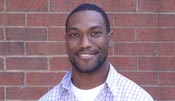
BIOGRAPHY
LaTroy Francisco is a first year M.S. student in Applied Computer Science with a concentration in E-Commerce at the University of Memphis . He has been a Fellow with the NSF-funded project Tri-P-LETS since he earned a B.S. degree (cum laude) in computer science from Albany State University . While pursuing his undergraduate degree, Mr. Francisco served two years as an SGA senator and school ambassador. In 2001, he became one of the youngest part-time staff members at Albany State , and in 2004, he was promoted to the position of Computer Technology Coordinator for the Housing Department. Mr. Francisco has also served various volunteer roles as the national Finance Director for ASUF, a national Christian fraternity and sorority, and as an assistant band director at two Albany area high schools. Between the years of 2002 and 2005, he was host to several convocation speakers at Albany State and facilitated open forums and panel discussions on education, race reform, and personal finance. In the fall of 2003, he was a keynote speaker at a financial workshop for student budget planning. Mr. Francisco is a free-lance writer for The Torch, the University of Memphis monthly news magazine associated with the national Black Student Association.
ABSTRACT
Serious Games to Enhance Science and Mathematics
Due to the increasing number of required topics for high school science courses, teachers may have difficulty covering all the material to their satisfaction. The situation is exacerbated because courses such as biology and chemistry require lab experiments to illustrate and clarify concepts, but activities are often too complicated to complete in one or two periods.
These concerns have come to our attention through project Tri-P-LETS (Three 'P' Learning Environment for Teachers and Students). Tri-P-LETS [1], an NSF-funded project, pairs computer science students (Fellows) from the University of Memphis with high school programming teachers in Memphis area high schools. The primary goal is for students to acquire better Problem solving skills, a firm foundation in Programming concepts, and experience using a disciplined Process for software development. A secondary goal is to provide students with realistic expectations about the computer science major. Students need experience solving problems in multiple domains; furthermore, computer science majors must complete a minimum of 30 semester hours in science and mathematics. Therefore, the principal investigator and Fellows have designed several modules for high school students where students interact or build 'serious' games (i.e. games that teach or reinforce mathematics and science concepts). The Tri-P-LETS modules consist of lesson plans, worksheets, and hands-on activities with simulation tools. Tri-P-LETS research over a period of two years has shown that this combination of teaching methods improves the effectiveness of teaching and student comprehension in the domains of discrete mathematics, (e.g., permutations and combinations [2]) and theoretical computer science (e.g., finite state and cellular automata [3]).
As a result of daily interaction with high school programming teachers and students, as well as conversations with biology, chemistry, physics, and mathematics instructors at the high school and college level, the authors believe that realistic simulations can enhance laboratory experiences in science and mathematics courses thereby resulting in deeper learning. This Chat 'n' Frag, which targets high school science, mathematics, and computer programming teachers, will begin with introductory comments about our experiences using AgentSheets [4], a game-authoring and simulation tool as a mechanism to improve problem-solving skills. The majority of the session will be an interactive tutorial on AgentSheets, where participants will learn the basic programming constructs as they implement a simulation of the hydrological water cycle. Upon completion of the implementation activity, there will be a discussion of the game's implications in high school classrooms, as well as in informal learning environments. In the remaining time, participants will have the choice of working through another worksheet (either the DNA Tetris or the Dice Probability project) or playing a selection of 8 games from our Science/Mathematics gallery.
References
[1] Tri-P-LETS web site.
[2] Sherrell, L. B., Robertson, J. J., & Sellers, T. W. (2005). Using
Software Simulations as an Aide in Teaching Combinatorics to High
School Students, Journal of Computing Sciences in Colleges, 20(6),
108-117.
[3] Thomas, Allen P., Sherrell, Linda B., and Greer, James B. (2006)
"Using Software Simulations to Teach Automata", Journal of Computing
Sciences in Colleges, (in press).
[4] AgentSheets website.